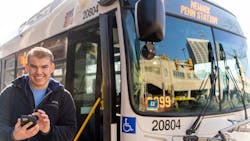NJ Transit advances zero-emission bus conversion with design and investment planning study
New Jersey Transit's (NJ Transit) zero-emission bus program continues to advance with the board awarding a contract aligned with the existing Garage Modernization Program that will focus on bus system design and capital investment planning.
The Zero-Emission Bus System Design and Investment Planning Study will develop and create standards and best practices that will be critical as the agency continues to move toward a 100 percent zero-emissions bus fleet.
“NJ Transit, through this study, will set the standards for the transformations in infrastructure, technology, fleet and operations for their transition to zero-emission buses,” said New Jersey Department of Transportation Commissioner and NJ Transit Board Chair Diane Gutierrez-Scaccetti. “NJ Transit is committed to meeting their aggressive zero-emission bus deployment schedule and milestones.”
“This important study approved by our board is a significant step forward for our zero-emission bus program, already well underway,” said NJ Transit President and CEO Kevin S. Corbett. “NJ Transit is committed to a responsible transition to a 100 percent zero-emissions bus fleet by 2040. We are leveraging our relationships with national and international peer agencies through APTA and UITP, respectively, to ensure we move forward deliberatively based on global best practices in order to achieve that goal.”
The contract with ZEBGO/NJ, a joint venture of WSP and STV, will identify the investments that are critical to a successful transformation of the bus network. The contract is for $9.4 million, plus five percent for contingencies, subject to the availability of funds.
Among the goals of the study are:
- The establishment of the roll out plan for a 100 percent zero-emissions fleet.
- The creation of a ‘playbook’ of practices, standard designs and construction specifications for zero-emission fleets, equipment, technology and training based on global best practices to make New Jersey’s a benchmark for the industry.
- Accelerated advancement of critical capital projects and programs to jump-start the readiness of infrastructure to receive zero-emission buses.
On Jan. 17, 2020, New Jersey Gov. Phil Murphy signed P.L.2019, c.362 that established requirements for NJ Transit to move toward zero-emission bus purchases by 2032. Specifically, all NJ Transit bus purchases made on or after December 2024 must include at least 10 percent zero-emission buses, escalating to 50 percent by December 2026 and 100 percent by December 2032.
In October of 2021, NJ Transit’s Board approved the purchase of eight battery electric buses, which will be a part of a limited deployment in the Camden region based out of the Newton Avenue bus garage.
The Camden project is a first of its kind initiative for NJ Transit, which will test battery-electric buses in real world conditions on specific NJ Transit routes. This will provide invaluable data and information on the effects of weather, passenger volume, road conditions and other factors on battery electric bus performance, including travel distance available between recharging. The project will also review the infrastructure resources and work required to modernize NJ Transit’s bus garages to accept new charging stations and the significantly greater power feeds needed to energize them.
The Bus Garage Modernization project was identified as a capital need in NJ Transit’s 5-Year Capital Plan and is aligned with NJ Transit’s commitment to achieving a full transition to a 100 percent zero-emissions bus fleet by 2040 and meeting the schedule included in Gov. Murphy’s mandates P.L.2019, c.362.
As part of the continued progress on the ambitious Bus Garage Modernization project, in March 2022, the NJ Transit Board of Directors approved a $4.3 million contract with AECOM for 100 percent Final Design and Construction Assistance for the Hilton Garage charging infrastructure in Maplewood, as well as a systemwide survey and condition assessment for all 16 of NJ Transit’s bus garages to identify the structural, power & utility and information technology upgrades necessary, as well as other physical elements, to support zero-emission buses.
